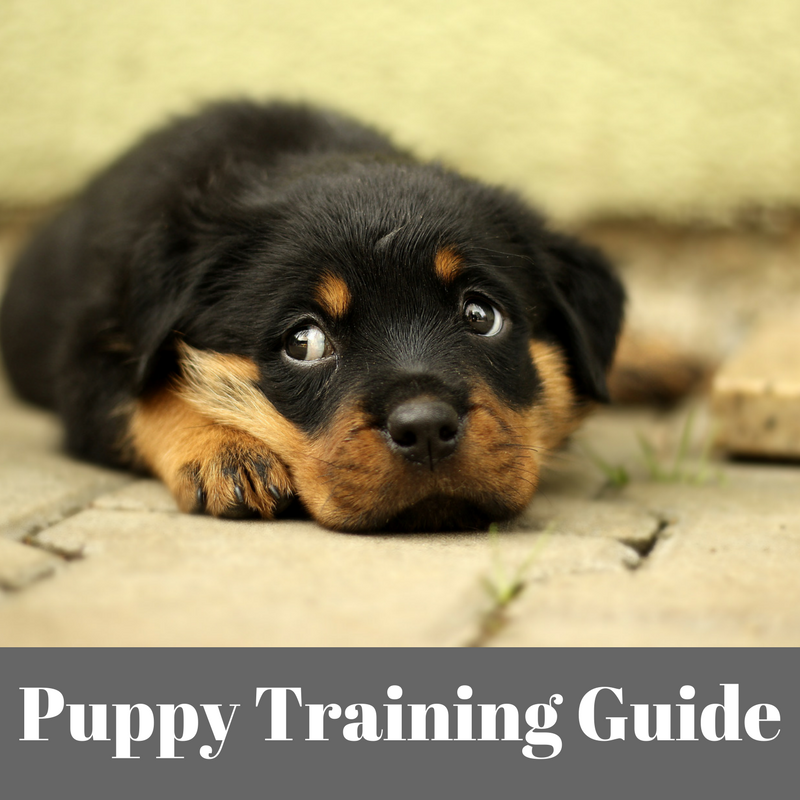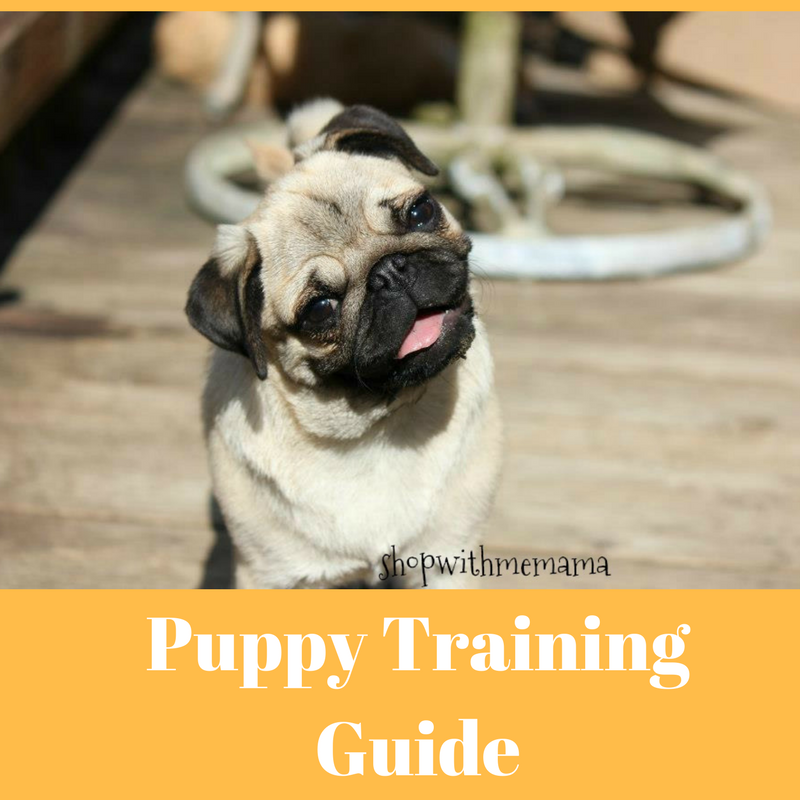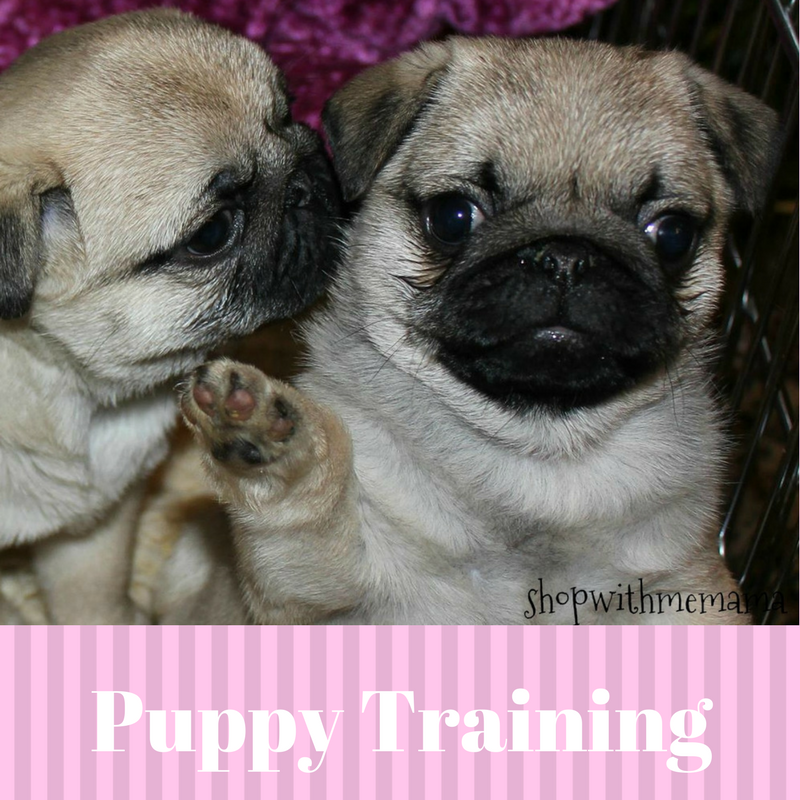This post is all about a Puppy Training Guide! When I get a new puppy, I know there’s a short time span in which I help teach it good habits.
Train your puppy when he or she is a couple of months old or as soon as you are able to. It can be difficult because they may have a short attention span, or you find it cute when he or she does something naughty.
I know with my Pomeranian, Miss Daisy, she can do some really funny things, but if I giggle too much about it I might encourage her to continue doing those things! I have to control my laughter at times!

Puppy Training Guide
Implement the following guideline into your training schedule, especially when he or she is a couple of months old. It develops their minds, making it easier for you to train harder commands when they’re slightly older.
Potty Train Your Puppy
Dogs naturally want to pee away from their sleeping area. Potty training a puppy is important because it teaches your puppy not to pee inside the home.
Start from the first day your puppy is old enough to walk confidently. Puppies like to pee in the same place each time. After meals, take your puppy to the backyard and wait for him or her to pee. The puppy will form a habit that’s reinforced to that area.
Your puppy will eventually go to this area without your help. Remember, it can take up to three months for your puppy to be well trained, so be patient and understanding. Frustration will only take you backward.
Crate Training
There are times you may need to put your pup in a crate; whether for holiday trips or vet visits, your puppy must go into the crate without a fight.
Put your puppy in the crate and close the door. Leave him in for a few minutes. Your pup may cry, so put a toy inside for entertainment. With time your pup will be relaxed and realize there is nothing wrong with being in the crate.
It’s also important that they don’t feel any discomfort while inside. Do your research and learn about dog crate sizes to see which is the most suitable for your pup. Once your pup is used to the crate, you can then begin training him or her to stay in it for longer periods.
Important note: Twice to three times a day is enough for puppy training since puppies have short attention spans. Focus on consistency and repetition rather than long training sessions.

No Biting Training
Puppies love to bite. I always panic when they go missing, or when they’re quiet because they’ve gotten hold of something to chew—like an electric wire or my new wallet!
The simplest way to prevent your puppy from biting is as follows:
-Separate all children from the biting pup
-Don’t excite or encourage the biting by teasing or play fighting
-If your puppy bites turn your attention away
-Incorporate a punishment such as a timeout, or a stern reprimand
-You can also squeal or yelp which lets the pup know he or she has hurt you
Response Training
Teach your puppy to learn the command “come”. Whether by whistle or their name, your puppy must have an automatic response to it. Think of cues to shout when you want your puppy to come to you. Start by getting their attention.
Demand this cue every time. Be excited to get the pup intrigued. When your pup comes to you, reward him or her to encourage the same in the future. Move away and perform the command again.
Teach your puppy to sit. You may need to push down on its rear to make it understand this command. When he or she sits, give them a treat for the appropriate response. Practice a couple of times with rewards.
Another response cue you should teach your pup is the ability to stay. Tell your pup to sit. Say “stay” and wait a while. Throw the treat and say “go fetch”. Your puppy will associate both actions with the command you’ve given.

I hope you learned a few things from my post a Puppy Training Guide. Puppy training is a repetitive task that takes time and patience.
But it’s important to make caring for your puppy so much easier. A trained puppy will grow to be an obedient, respectful and loyal dog. Your future self will thank you!
Lily Kwan says
This training guide is very helpful. Thanks for sharing!
Rae74 says
Thanks for this information my son got a puppy for Christmas
rose cantu says
Very useful information
kathy pease says
I wish I could train our dog to stop barking at the neighbors..You would think he would be use to them by now but barks every time they are outside.
Buddy Garrett says
I love all of the great ideas. It is very important to train your puppy.
natasha lamoreux says
Great tips on puppy training. We have definately struggled in the past trying to train a new pup.
Michele Pineda says
great ideas! My 7 month old pitbull puppy is doing well with her commands thankfully, although she’s so big she no longer looks like a puppy!
Leela says
Thanks for all the info.
Laurie Nykaza says
Great information on puppies training . I have 3 rescues they were older when we got them so we didnt have to go through it .
Katie Bellamy says
Great tips! Thanks for sharing!
Jessica W. says
One day, I will adopt my very first puppy. I’ll need to remember these tips!
Darlene Carbajal says
I remember I had to train my dog how to use the bathroom. He learned so quick!
According to Ashley Bree says
thank you for sharing this!
vickie couturier says
i do puppy training just like child potty training,,starting with a schedule,first thing in the morning and right before bed ,,and anytime they eat,,and just several times a day to go an try
Amanda Thornton says
I will be sharing this with my gma her puppies are her babies
dzstovall says
Those Pugs are ADORABLE! Thanks for the great suggestions, my brother just got a new pup so I’ll be sure & share your tips!
patty.wright says
I have never had a dog and I am not a dog person. I love cats
Darcy L Koch says
I wish my daughter had trained her puppy before she left her with me while she went to Florida. She peed all over despite having those training pads.
Mia says
These are such good suggestions. I haven’t had a puppy for a few years but know how consistent and positive training has to be for it to be effective.